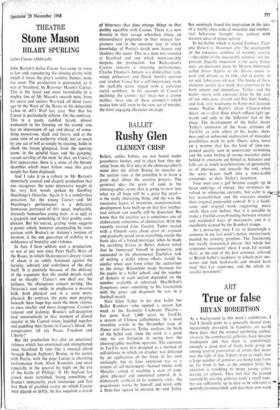Julius Caesar (Aldwych)
THEATRE
Stone Mason
HILARY SPURLING
john Barton's Julius Caesar has come to town at last and, considering the shining clarity with which it treats the play's sombre themes, none too soon. The production is dominated, as it was at Stratford, by Brewster Mason's Caesar. This is the latest and most formidable in a mighty line of Mr Mason's smooth men, from his suave and sinister. Warwick all those years ago in the Wars of the Roses to his delectable Lafeu in Atli Well last year. Not that his Caesar is particularly urbane. On the contrary. This is a pasty, raddled tyrant, almost womanish in his fawning on the crowd; one has an impression of age and decay, of some- thing monstrous, slack and heavy, and at the same time of an authority which, not so much by any act of will as simply by existing, holds in check the forces glimpsed, from the opening scene, in the spiteful faces and the gawping, vacant servility of the mob. So that, on Caesar's first appearance, there is a sense of the bloody shambles which must follow once this great weight has been displaced.
And I take it as a tribute to Mr Barton's immensely assured and shapely production that one recognises the same impressive weight in the very first words , spoken by Geoffrey Hutchings's Octavius. Again it is a comfortless sensation, for the young Caesar—and Mr Hutchings's performance is a delicately humorous portrayal of this squat, implacable, intensely humourless young man—is as ugly as a gargoyle and something of that grubby com- plexion. But his coarse, grating voice suggests a, power which, however unappealing by com- parison with Brutus's or Antony's notions of heroism, is the one guarantee of stability in a wilderness of brutality and violence.
In fact, I have seldom- seen a production, or not at any rate since Peter Hall's Wars of the Roses, in which Shakespeare's dreary vision of chaos is so subtly balanced against the lucidity, sobriety and orderliness of the play itself. It is precisely because of the delicacy of the argument that .the sordid details stand out so sharply: Caesar's one deaf ear, his epilepsy, his obsequious conceit serving, like Octavius's sour smile, to emphasise a massive bulk, both physical and in a sense meta- physical. By contrast, the petty men peeping beneath these huge legs seem the more vicious, at once smaller and more dangerous. Cassius's rancour and jealousy, Brutus's self-deception lead remorselessly to that moment of dismal squalor in the Capitol when, huddled together and paddling their hands in Caesar's blood, the conspirators 'all cry Peace, Freedom and Liberty!'
But the production has also an emotional richness which has sweetened and strengthened since Stratford. It runs like a musical chord through Barrie Ingham's Brutus, in his scenes with Portia, with the page Lucius (a charming performance from Alton Kumalo), and most especially in the quarrel by night on the eve of the battle of Philippi. If Mr Ingham has grown more tarnished, losing something of Brutus's immaturity, even innocence, and that first flush of gratified vanity on which Cassius once pined so deftly, he has acquired a streak of bitterness that does strange things to that shabby squabble with Cassius. There is a new ferocity in their savage schoolboy abuse, an extraordinary poignancy in their mutual for- giveness and in the uncanny way in which knowledge of Portia's death now haunts and shadows this scene. This is a note not sounded at Stratford and one which immeasurably deepens the production. Ian Richardson's Cassius remains a towering performance, Charles Thomas's Antony is a dishevelled, rash, windy enthusiast, and Derek Smith's morose and virulent Casca has a self-importance (note the ineffable scorn, tinged with a judicious social snobbery, in his account of Caesar's declining the crown—`yet 'twas not a crown neither, 'twas one of these coronets') which makes him still, even in the very act of murder, the most engaging character on stage.






































 Previous page
Previous page